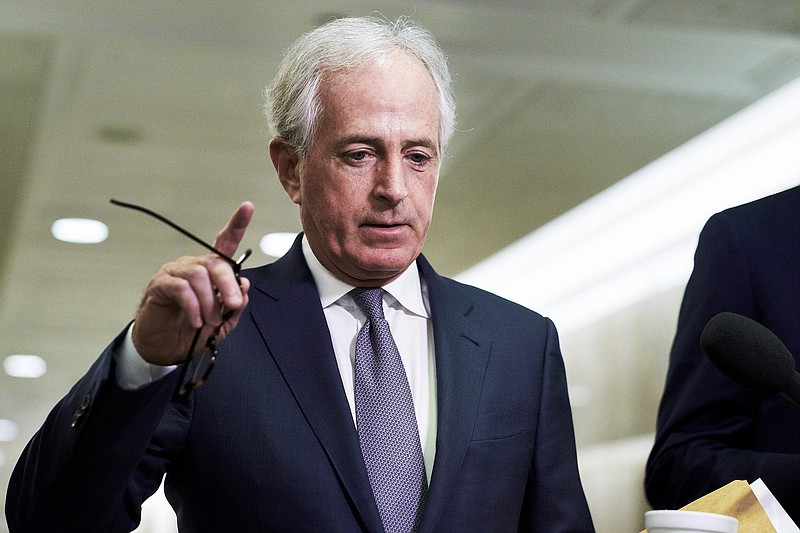Behold, our stalwart Bob Corker - the only Republican to vote against the so-called tax reform plan.
The one who said he wouldn't vote for a bill that adds "one penny" to the deficit. The one who pushed a trigger mechanism that would claw back some tax cuts if economic growth doesn't cover costs (and the Joint Committee on Taxation says it won't).
The Corker who said in September he would not vote for this legislation unless it "reduces deficits and does not add to deficits with reasonable and responsible growth models."
Recall our Corker who said in early October: "Deficits matter. They're a greater threat to us than North Korea or [the Islamic State]."
Just a couple of weeks ago, our two-term Republican Tennessee U.S. senator said, "If I believe it's going to add to the deficit, I'm not going to vote for it."
Monday, he said he might vote "no" in the Senate's Budget Committee hearing, a necessary step toward passing a bill through reconciliation.
But he voted "yes," and Tuesday's Vanity Fair headline clobbered him: "Bob Corker descends from high horse to vote 'yes' on tax bill." His vote moved it out of committee and onto the Senate floor.
Despite all that playing hard-to-get, Corker at each juncture did continue moving along this horrible tax bill - one that any third-grade math student should be able to determine will blow at the very least a $1 trillion hole in the budget in the next decade.
It fit, unfortunately, with other of our favorite son's past actions: Talk high brow, capitulate. Like the times he worked with Democrats on an auto sector bailout and on new regulations for Wall Street, only to abandon the efforts later.
He likes to talk about his integrity. Call it instead, "party-tegrity."
"Bob Corker has made a career out of protesting very loudly, and then falling in line with his party's leadership when it counts," Brian Fallon, a former spokesman for Sen. Charles E. Schumer, D-N.Y., the minority leader, told The Washington Post this week. "Being a maverick requires actually voting your conscience on the Senate floor, not just saying the right things on the set of Morning Joe."
But Corker did keep trying to reshape the bill once it got to the floor.
The former Chattanooga mayor, who has said he will not seek a third Senate term, told CNBC he would remain a firm "no" unless his other lawmaker colleagues agreed to some sort of "backstop or trigger" should the tax bill fail to produce enough growth to offset its cost.
They didn't. Corker and Jeff Flake, R-Ariz, who also is not seeking re-election next year, were informed that their proposed "trigger," a mechanism to raise taxes if economic growth came in slower than projected, would not be allowed by the Senate's parliamentarian.
On Thursday night, Sens. Corker and Flake said they wanted to raise another $500 billion given the Joint Committee on Taxation analysis. Yet come Friday morning, their efforts to include future tax increases to offset the deficit impact of the bill were rejected by Senate leadership. Meanwhile other amendments were added that Democrats hadn't seen but lobbyists had - even as debate began on the floor Friday afternoon.
In the end, Corker stood steady to his fiscal hawk motto. He voted no on the tax bill.
"I wanted to get to yes. But at the end of the day, I am not able to cast aside my fiscal concerns and vote for legislation that I believe, based on the information I currently have, could deepen the debt burden on future generations," he said Friday in a statement.
Now the excuse from most Republicans - and yes, still Corker, has a ridiculously vague hope that the issue can be addressed in conference committee negotiations with the House.
Corker tried. But was it too little, too late?
That may be the Senate legacy of Bob Corker.
